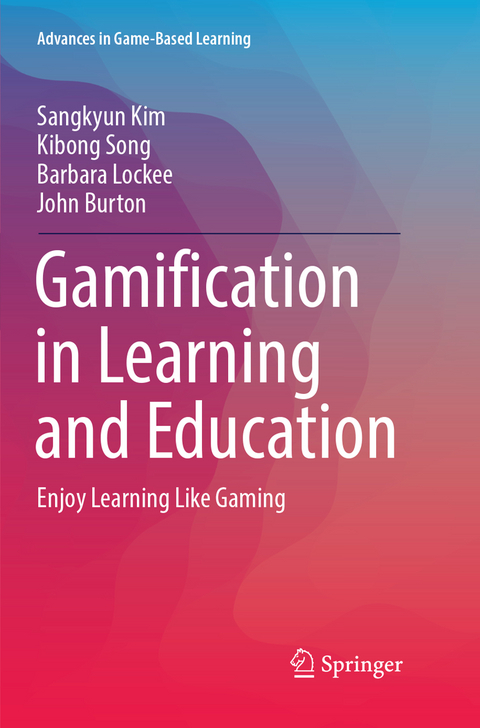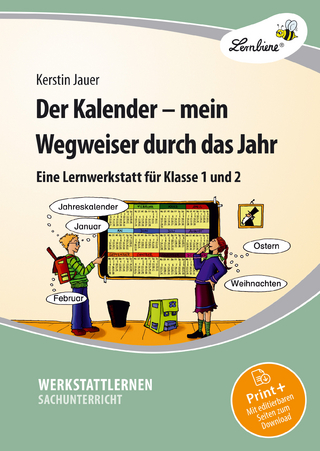
Gamification in Learning and Education
Springer International Publishing (Verlag)
978-3-319-83698-0 (ISBN)
This book explores the theoretical foundations of gamification in learning and education. It has become increasingly difficult to engage and motivate students. Gamification not only makes learning interesting, but also allows game players to solve problems and learn lessons through repeated attempts and failures. This "positive failure" can motivate students to attempt a difficult mission. Chapters in this volume cover topics such as the definition and characteristics of gamification, gamification in learning and education, theories, research on gamification, framework, strategy, and cases.
Dr. Sangkyun Kim is a professor of Systems and Management Engineering at Kangwon National University. He has served Game Literacy Division of Korea Game Society as a chairman and the representative of Education Gamification Forum. He has earned Teaching Excellence Award three times from Kangwon National University. He received his Ph.D. in Cognitive Science from Yonsei University, Seoul, South Korea, a master's degree in Industrial Engineering from Yonsei University, and a bachelor's degree in Control and Instrumentation Engineering from Chungang University, Seoul, South Korea. Dr. Kibong Song is an adjunct faculty at Virginia Tech. He has worked as a learning solution expert in corporates and higher education institutions. He has published books and articles on learning environment, talent development, and e-learning evaluation method. He earned his Ph.D. in Curriculum and Instruction with a concentration in Instructional Design and Technology from Virginia Tech, a master's degree in Industrial Engineering from Yonsei University, Seoul, South Korea, and a bachelor's degree in Computer Science and Engineering from Dongguk University, Seoul, South Korea. Dr. Barbara Lockee is a professor of education specializing in Instructional Design and Technology. She earned a Ph.D. in Curriculum and Instruction with a concentration in Instructional Technology from Virginia Tech. She has served as a president for the Association for Educational Communication & Technology and a director of Office of Educational Research and Outreach. To date she has authored or coauthored more than 90 journal articles, book chapters, invited columns and articles, and conference proceedings. She has also edited one book and developed softwar e. She has contributed greatly to the field by presenting at many regional, national, and international conferences. In addition, she has been an invited speaker at a number of conferences and organizational meetings at the national and international level. Dr. John K. Burton is a professor of education specializing in Instructional Design and Technology. He earned a Ph.D. in Educational Psychology from the University of Nebraska-L incoln. To date Dr. Burton has authored or coauthored more than 85 refereed articles, book chapters, technical reports, instructional software, instructional television scripts, and book/software reviews. Dr. Burton has also contributed greatly to the field by presenting at many regional, national, and international conferences. Dr. Burton has held numerous leadership positions during his tenure at Virginia Tech including, but not limited to, his position as Associate Director for Educational Research and Outreach from 2005-2008 and his current position as Director of the Center for Instructional Technology Solutions in Industry and Education (CITSIE).
Chapter 1. Beginning of Journey.- Chapter 2.Engagement and Fun.- Chapter 3. What Is a Game?.- Chapter 4.What is Gamification in Learning and Education?.- Chapter 5.Theories for Gamification in Learning and Education.- Chapter 6.Students' Perception of Gamification in Learning and Education.- Chapter 7.Gamification Framework.- Chapter 8.Gamification Strategy.- Chapter 9.Legal and Ethical Issues.- Chapter 10. Gamification Cases in Education.- Chapter 11.Gamification Cases in STEM Education.- Chapter 12.Gamification Cases in Liberal Arts and Social Science Education.- Chapter 13.Gamify Your Instruction.
| Erscheint lt. Verlag | 11.9.2018 |
|---|---|
| Reihe/Serie | Advances in Game-Based Learning |
| Zusatzinfo | XIV, 159 p. 76 illus., 60 illus. in color. |
| Verlagsort | Cham |
| Sprache | englisch |
| Maße | 155 x 235 mm |
| Gewicht | 278 g |
| Themenwelt | Schulbuch / Wörterbuch ► Unterrichtsvorbereitung ► Unterrichts-Handreichungen |
| Geisteswissenschaften ► Psychologie ► Allgemeine Psychologie | |
| Geisteswissenschaften ► Psychologie ► Pädagogische Psychologie | |
| Sozialwissenschaften ► Pädagogik ► Schulpädagogik / Grundschule | |
| Schlagworte | Engagement • Gamification • Gamification Strategy • Learning and education • Learning and Instruction • Strategy |
| ISBN-10 | 3-319-83698-6 / 3319836986 |
| ISBN-13 | 978-3-319-83698-0 / 9783319836980 |
| Zustand | Neuware |
| Haben Sie eine Frage zum Produkt? |
aus dem Bereich


